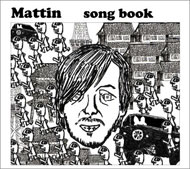Rockoo (Russia)
Этот альбом должен удивить тех, кто знает Маттина только как компьютерного импровизатора, поскольку на нем нет никаких компьютеров, а есть только песни под гитару в стиле, который условно можно было бы охарактеризовать как “Лу Рид играет свои любимые песни Егора Летова”. Грязно сыгранные на акустической гитаре песни менестреля-аутсайдера. Такая характеристика, между прочим, близка к тому, как говорит об этой своей работе сам музыкант: “Я бы описал” Song Book “как сборник самых примитивных номеров в духе Лу Рида, на которые я только способен. Я имею в виду, что Лу Рид свое время записал несколько плохих пластинок, но я уверен, что мне удалось записать пластинку гораздо хуже”.
Маттин играет плохо, но делает это вполне сознательно. Никаких претензий, никаких амбиций больших амбиций “парня из соседнего двора” или даже “парня, которого никогда никто не слушает, потому что не умеет играть”. Поет он еще хуже. Все песни записаны на внутренний микрофон компьютера и представлены публике без всякого последующего редактирования. Отсюда чуть глуховатый звук, перегрузка по низких частотах и едва слышный писк. Иногда кажется, что пение доносится из соседней комнаты. На некоторых песнях вместо гитары появляется что-то типа органа.
Это пародия на поп-музыку авторов-исполнителей (поэтов-песенников), на их жонглирование настроениями с помощью масок лиричности, пафоса или драйвового героизма. Маттин одна за другой примеряет на себя эти маски: то отчаянно лупить по струнам, то – там где это предусмотрено сценарием поп-пьесы – играет “душевным” перебором. Он издевается над нами? Нет. Он издевается над нашего восхищения попом, в котором артикуляция исполнителя способна любой ерунды – и музыкальной и поэтической – придать вид откровения. Издевается над нашего восхищения чепухой.


